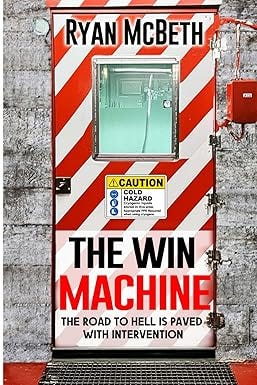The Win Machine. Book review of this techno - financial thriller by Ryan McBeth, by DH Marks
Gripping Techno financial thriller by Ryan McBeth with a catchy computer twist, drone swarms, attack robot dogs all in the USA
Book review by Donald Harvey Marks
Physician, Scientist and 3rd generation veteran
Ryan McBeth's "The Win Machine" is a captivating techno-financial-thriller that explores the potential for manipulating financial markets, international relations, elections through advanced technology with supercomputers, AI and algorithms. The novel centers around a fictional machine capable of predicting and influencing investing and voter behavior with unprecedented accuracy. While the book offers a chilling glimpse into the future of political warfare, a critical analysis reveals several areas for discussion.
Probability of Technological Development:
The novel's central premise hinges on the existence of a "Win Machine," a sophisticated technology capable of analyzing vast datasets, predicting individual tradable market trends and then later on voter preferences, and then micro-targeting persuasive messages. While the book's technology is fictional, it draws inspiration from real-world advancements in data analytics, artificial intelligence, social media manipulation and the coming development of more advanced computing networks like quantum computers. See my recent review of the excellent book The End of Reality https://dhmarks.blogspot.com/2024/02/r-eview-of-end-of-reality-by-johathan.html
Argument for Plausibility: The rapid evolution of AI and the increasing sophistication of data mining techniques make it conceivable that a less extreme version of the "Win Machine" could emerge in the near future.
* Argument Against Plausibility: The book depicts a level of technological sophistication and predictive accuracy that “maybe” is just beyond the current capabilities of AI. True mind reading and perfectly orchestrated social engineering remain for the moment at least largely in the realm of science fiction.
2. Overlooking AI-Generated Data:
McBeth's novel appears to predate the current AI revolution. A significant critique lies in its potential oversight of how easily the vast datasets required by the "Win Machine" can now be generated using AI agents. These agents could:
Create Synthetic Data: AI can now generate incredibly realistic synthetic data, including social media posts, news articles, and even video content. This could and probably is right now used to manipulate public opinion and create the illusion of grassroots support.
Automate Data Collection: AI can already efficiently shift through massive amounts of online data, identifying patterns and vulnerabilities that human analysts might miss. This could be used to target specific demographics with tailored propaganda.
Foreign Interference and Election Manipulation:
The book raises valid concerns about the potential for foreign powers , particularly Russia and China, to exploit such technology to interfere in elections.
Real-World Examples: Recent history provides numerous examples of foreign actors attempting to influence elections through cyberattacks, disinformation campaigns, and social media manipulation.
Increased Risk: The "Win Machine" amplifies these concerns, suggesting that advanced technology could be used to manipulate entire populations with unprecedented precision.
4. Other Areas of (Mild) Criticism I have:
Ethical Considerations: The book raises important ethical questions about the use of such technology. Is it morally justifiable to manipulate voters, markets, governments even if it's for a "good" cause? Who decides what constitutes a "good" cause?
Erosion of Trust: The widespread use of such technology could erode public trust in democratic institutions and the electoral process. I have already been there for a while. As Stalin has said. It's not the voters who decide an election, but the people who count the vote
Potential for Abuse: The "Win Machine" could be used to suppress dissent, target vulnerable populations, and further entrench existing power structures. I think we are already seeing this
In conclusion, "The Win Machine" serves as a thought-provoking exploration of the potential dangers of unchecked technological advancement in the financial and political arenas. While the book's central premise may be a work of fiction, it highlights real-world concerns about data privacy, the manipulation of public opinion, and the erosion of trust in democratic institutions.
The author Ryan McBeth is a very knowledgeable veteran and has an interesting YouTube channel and a Substack, which I recommend highly recommend.



